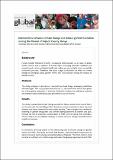| dc.contributor.author | Esho, Tammary | |
| dc.contributor.author | Komba, Everlyne | |
| dc.contributor.author | Richard, Fabienne | |
| dc.contributor.author | Shell-Duncan, Bettina | |
| dc.date.accessioned | 2021-09-10T19:43:06Z | |
| dc.date.available | 2021-09-10T19:43:06Z | |
| dc.date.issued | 9/10/2021 | |
| dc.identifier.issn | 2047-2986 | |
| dc.identifier.uri | http://repository.amref.org/handle/123456789/235 | |
| dc.description | Creative Commons Licence
This work is licensed under a
Creative Commons Attribution
4.0 International License . | en_US |
| dc.description.abstract | Background
Female Genital Mutilation (FGM) is recognized internationally as an issue of global health concern and a violation of human rights. Changing climactic conditions are argued to put a strain on Maasai livelihoods making women and girls more susceptible to harmful practices. Therefore, this study sought to elucidate the effect of climate change on changing social, gender norms and FGM practice among the Maasai of Kajiado County.
Methods
The study employed a descriptive cross-sectional study design, employing qualitative methodologies. The study purposively selected 12 key-informants and 8 participants for a focus group discussion. A thematic framework analysis was utilized to examine and interpret data and findings were presented in narrative form.
Results
The study revealed that climate change eroded the Maasai social and economic fabric and in particular, the dwindling of their livelihoods whose mainstay has been livestock thereby sunk these communities into abject poverty. These changes have resulted in widening of gender inequalities and further disempowerment of women and girls, through the loss of education, perpetuation of FGM, and increasing child marriages. These practices are an adaptive strategy to survive climactic changes but detrimental to girls and women.
Conclusions
In conclusion, the study points to the intersecting axes of climate change on gender norms and FGM. The study portends that broader socio-ecological factors pose as barriers to social norms change among the Maasai of Kajiado. Therefore, there is need to adopt a multilevel intersectional approach when designing programmes to end FGM. The contextual social, economic and environmental factors should not be overlooked when tailoring FGM intervention programs. | en_US |
| dc.language.iso | en | en_US |
| dc.publisher | Edinburgh University Global Health Society | en_US |
| dc.subject | Female genital Mutilation (FGM) | en_US |
| dc.subject | Female genital Cutting(FGC) | en_US |
| dc.subject | Human rights | en_US |
| dc.subject | Girls | en_US |
| dc.subject | Education | en_US |
| dc.subject | Child marriage | en_US |
| dc.subject | Kenya and Tanzania | en_US |
| dc.title | Intersections Between Climate Change and Female Genital Mutilation among the Maasai of Kajiado County, Kenya | en_US |
| dc.type | Article, Journal | en_US |

